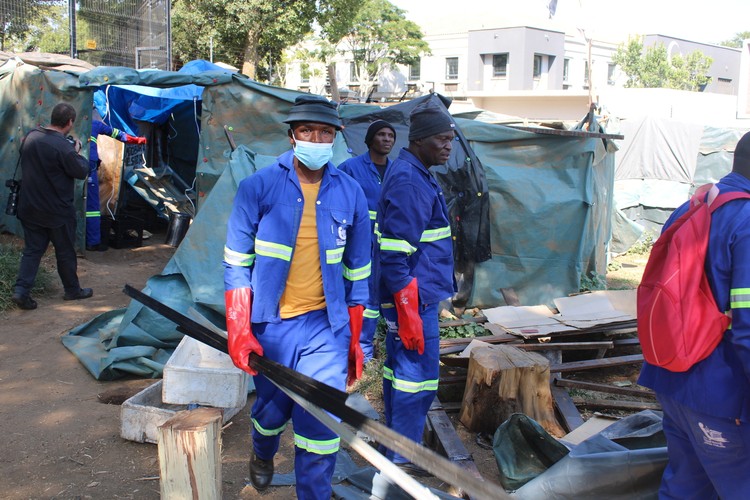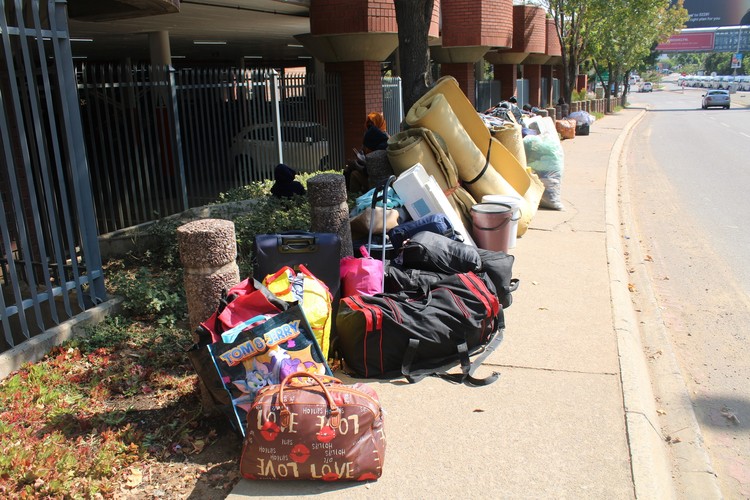Refugees evicted from UNHCR offices in Pretoria
UN refugee agency expresses relief that the operation was carried peacefully
Workers demolish shacks that the refugees had been living in. Photos: Kimberly Mutandiro
- Refugees living outside the UN refugee agency’s offices in Pretoria were evicted on Friday.
- Refugees were given an option of being moved to Lindela or being arrested.
- A UNHCR spokesperson said families would be kept together and that food, sanitation, and medical facilities would be provided at Lindela.
Refugees who have been camping outside the Pretoria offices of the United Nations High Commissioner for Refugees (UNHCR) for the past year were finally evicted on Friday.
From the early hours of the morning, numerous police vehicles were parked along the Waterkloof Road in Pretoria.
The 33 families of refugees were given an option to voluntarily go to Lindela, a detention centre for undocumented immigrants on Wednesday. But they refused. After refusing the Wednesday offer, police promised to come and forcefully remove them on Friday.
According to the UNHCR, the families can live freely at the repatriation centre and come and go as they please.
Sheriff Steven Brits from the Pretoria High Court was in charge of the eviction on Friday. There were also officials from the City of Tshwane and municipal workers ready to tear the shacks down.
People we spoke to said they were given an option to either accept going to Lindela or be arrested and taken to prison. When asked which option they would take, “not Lindela” was the answer.
Papa Kanana, was taken into a van. He said he did not want to be taken to Lindela. “They are treating us as if we are criminals, bringing dozens of police, yet all we wanted was to be taken to a safe place away from South Africa,” Kanana said.
Twenty-year-old Rajabu Majidi said before being ordered into a van by police: “We are being taken to Lindela which is a jail. Why not to another place because we did nothing wrong? We are just refugees seeking safety.”
Some of the refugees took their belongings and moved onto the street.
Belongings of those refugees who moved onto the streets to try to avoid going to Lindela.
By 10am men in blue overalls began tearing the shacks apart.
“I don’t know where l will take my family. Someone promised to take us to a church but we will just wait and see who will help us. I have a family of ten children who include my grandchildren. No mother can allow her children to live in a prison like Lindela,” said Therisa Walu, who was crying.
“Should they want us to reintegrate, what community will we go to without valid asylum documents? Police will just arrest us. We have been living without an income since 2019. How will we earn a living? Our children are traumatised because of the hostility we receive in this country,” she said.
With her was her 24-year-old daughter, Masi Walu, who explained that despite growing up and attending school in South Africa, life had been difficult. Her family arrived in South Africa from the Democratic Republic of the Congo when she was very young.
“In school we were called names for being foreigners. Some of my friends who were South African citizens are in university now, but l am not because l have no papers … I would not mind living in South Africa if we had valid papers and access to services with no hassles, but all of that is a struggle.”
She said that South Africa was the only home she knew but that she had been let down, that her life had not turned out as she planned, and her dreams had been shattered.
Laura Padoan, spokesperson for the UNHCR said, “We are relieved that the operation being carried out today by the authorities following last week’s order of the High Court has thus far been carried out peacefully.”
Padoan said those removed were being taken to Lindela. Efforts would be made to keep parents and children together and that food, sanitation, and medical facilities would be provided. She said if those taken to Lindela wished to reintegrate into the community or to return voluntarily to their countries of origin, UNHCR staff would assist. She said 15 people from the group had taken this option.
Next: Public display of old SA flag is hate speech, rules SCA
Previous: PRASA’s decision to cancel railway security contracts “reckless and irresponsible” says SCOPA chair
© 2023 GroundUp. This article is licensed under a Creative Commons Attribution-NoDerivatives 4.0 International License.
You may republish this article, so long as you credit the authors and GroundUp, and do not change the text. Please include a link back to the original article.
We put an invisible pixel in the article so that we can count traffic to republishers. All analytics tools are solely on our servers. We do not give our logs to any third party. Logs are deleted after two weeks. We do not use any IP address identifying information except to count regional traffic. We are solely interested in counting hits, not tracking users. If you republish, please do not delete the invisible pixel.




